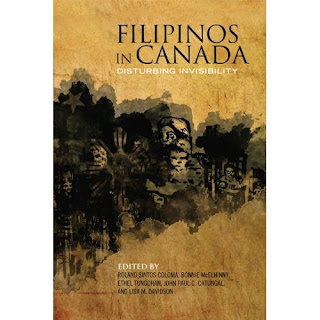Filipinos in Canada: Disturbing Invisibility
Labels:
About Vonjobi,
Books and Movies
Filipinos in Canada: Disturbing Invisibility
Edited by Roland Sintos Coloma, Bonnie McElhinny, Ethel Tungohan, John Paul C. Catungal, and Lisa M. Davidson
Toronto: University of Toronto Press
The book is available in hardcover and paperback on Amazon.ca and the University of Toronto Press website.
Composed of papers presented at “Spectres of In/Visibility: Filipina/o Lives in Canada” in Toronto, Ontario, Canada, on 23 October 2009 (plus a few more added after the conference), this book is the first academic publication to bring together the works of Filipino, Canadian, and Filipino-Canadian scholars about the experiences of Filipinos in Canada.
[Disclosure: One of its chapters, "Borrowing Privileges: Tagalog, Filipinos, and the Toronto Public Library," is a paper I wrote not because it was directly related to the dissertation I was writing at that time, but because I wanted the field of library and information science (LIS) represented in this groundbreaking work.]
Below are some of the articles about the book and its launching that have appeared in print and online, followed by the press release about the book, and its table of contents.
"Prof. Roland Sintos Coloma on disrupting invisibility of Filipino-Canadians" by Dyan Ruiz
"Big crowd welcomes book on Filipinos" by Hermie Garcia
"Academia and Activism" by Ethel Tungohan
"The invisible Pinoy" by Joe Rivera
Filipinos in Canada: Disturbing Invisibility
The Philippines became Canada’s largest source of short- and long-term migrants in 2010, surpassing China and India, both of which are more than ten times larger. The fourth-largest racialized minority group in the country, the Filipino community is frequently understood by such figures as the victimized nanny, the selfless nurse, and the gangster youth. On one hand, these narratives concentrate attention, in narrow and stereotypical ways, on critical issues. On the other, they render other problems facing Filipino communities invisible.
This landmark book, the first wide-ranging edited collection on Filipinos in Canada, explores gender, migration and labour, youth spaces and subjectivities, representation and community resistance to certain representations. Looking at these from the vantage points of anthropology, cultural studies, education, geography, history, information science, literature, political science, sociology, and women and gender studies, Filipinos in Canada provides a strong foundation for future work in this area.
Part I
Difference and Recognition
Chapter 1
Spectres of In/visibility: Filipina/o Labour, Culture, and Youth in Canada
Bonnie McElhinny (University of Toronto), Lisa M. Davidson (University of Toronto), John Paul C. Catungal (University of Toronto), Ethel Tungohan (University of Toronto), and Roland Sintos Coloma (University of Toronto)
Chapter 2
Filipino Canadians in the Twenty-First Century: The Politics of Recognition in a Transnational Affect Economy
Eleanor Ty (Wilfrid Laurier University)
Chapter 3
Filipino Immigrants in the Toronto Labour Market: Towards a Qualitative Understanding of Deprofessionalization
Philip F. Kelly (York University), Mila Astorga-Garcia (Community Alliance for Social Justice), Enrico F. Esguerra (Community Alliance for Social Justice), and the Community Alliance for Social Justice, Toronto
My Folks
Carlo Sayo (Sinag Bayan (Light of the Nation) Cultural Arts Collective) and Jean Marc Daga (SIKLAB Ontario)
Part II
Gender, Migration, and Labour
SCRAP
Reuben Sarumugam (Magkaisa Centre) and Bryan Taguba
Chapter 4
The Recruitment of Philippine-trained Healthcare Professionals to Canada in the 1960s
Valerie G. Damasco (University of Toronto)
Chapter 5
The Rites of Passage of Filipinas in Canada: Two Migration Cohorts
Josephine Eric (Migrant Workers Family Resource Centre)
Chapter 6
(Res)sentiment and Practices of Hope: The Labours of Filipina Live-in Caregivers in Filipino Canadian Families
Lisa M. Davidson
Chapter 7
Debunking Notions of Migrant “Victimhood”: A Critical Assessment of Temporary Labour Migration Programs and Filipina Migrant Activism in Canada
Ethel Tungohan (University of Toronto)
Chapter 8
Toronto Filipino Businesses, Ethnic Identity, and Place Making in the Diaspora
Cesar Polvorosa, Jr. (York University)
Chapter 9
Between Society and Individual, Structure and Agency, Optimism and Pessimism: New Directions for Philippine Diasporic and Transnational Studies
Leonora C. Angeles (University of British Columbia )
Part III
Representation and Its Discontents
Balikbayan Express
Celia Correa (University of Toronto)
Chapter 10
Meet Me in Toronto: The Re-Exhibition of Artifacts from the 1904 Louisiana Purchase Exposition at the Royal Ontario Museum
Bonnie McElhinny
Chapter 11
From the Pearl of the Orient to Uptown: A Collaborative Arts-Based Inquiry with Filipino Youth Activists in Montréal
Marissa Largo (University of Toronto)
Chapter 12
Borrowing Privileges: Tagalog, Filipinos, and the Toronto Public Library
Vernon R. Totanes (University of Toronto)
Chapter 13
Abject Beings: Filipina/os in Canadian Historical Narrations
Roland Sintos Coloma
Chapter 14
Between the Sheets
Geraldine Pratt (University of British Columbia)
Part IV
Youth Spaces and Subjectivities
Colour Correction
Eric Tigley (Youth Education through Interactive Arts)
Chapter 15
Scales of Violence from the Body to the Globe: Slain Filipino Youth in Canadian Cities
John Paul C. Catungal
Chapter 16
Kapisanan: Resignifying Diasporic Post/colonial Art and Artists
Christine Balmes (University of Toronto)
Chapter 17
Educated Minorities: The Experiences of Filipino Canadian University Students
Maureen Grace Mendoza
Chapter 18
“Mas Maputi Ako sa ‘yo” (“I’m lighter than you”): The Spatial Politics of Intrarracial Colorism among Filipina/o Youth in the Greater Toronto Area
Conely de Leon (York University)
Chapter 19
The Social Construction of “Filipino Studies”: Youth Spaces and Subjectivities
Jeffrey P. Aguinaldo (Wilfrid Laurier University)
Part V
Afterword
Chapter 20
Contemplating New Spaces in Canadian Studies
Minelle Mahtani (University of Toronto) and David Roberts (University of Toronto)


